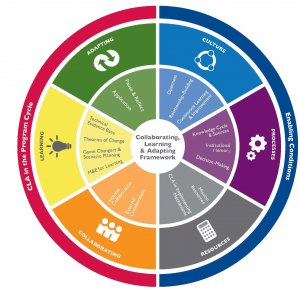This USAID Learning Lab podcast focuses the learning component of Collaborating, Learning, and Adapting (CLA) at the project and organizational levels.
The first segment of the episode follows a program focused on resilience in a crisis setting in Somalia which built in learning into the program design and uses mobile phone surveys to gather information across different communities to inform real-time program adaptations. Some key takeaways relevant to RBP include:
- Mobile Phone technology facilitating continuous context-specific analysis: The use of live-call mobile phone surveys were assessed as appropriate given the prevalence of mobile phone owners within the community and preference for this modality in terms of information exchange. The use and frequency of these surveys was able to capture the changing context and needs of communities on the ground in real time. These changes could be analyzed, summarized, and immediately integrated into scheduled community reflection exercises.
- Adaptation: For data collection, the implementing team was administering the surveys themselves which enabled them to analyze, monitor and evaluate their program in real-time, without needing to wait for periodic monitoring assessments. These approaches can facilitate timely and adaptive decision-making and problem solving.
- Relationship building and enhancing feedback loops: The fact that the implementation team was directly involved in the project data collection allowed them to build rapport and form relationships with communities and strengthen feedback loops with receiving information relevant to their programming and responding to concerns expressed in routine community reflection exercises. The participatory production and exchange of information between partner and community established a relevant method for communication and led to a shift in understanding of the project and how communities viewed their role in the process.
The second segment of the episode dealt with how to build intentional and systematic learning at the organizational level, specifically through the development of learning agendas. Learning agendas allow organizations be more strategic in ways they operate; appreciate what learning tools and results are available and identify areas for further learning (through evaluations, research, or experiential learning) and collaborate with relative stakeholders and apply learning in iterative fashion to programming.
